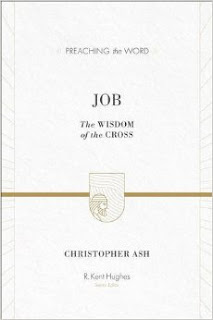I've gone through some chapters, and so far, it's pure gold. I can't commend it enough. Get the book and read it. Please. It's emotionally heavy stuff, but it will help us appreciate the cross of Christ all the more.
Let me share some excerpts from the chapter I read today. I hope this will encourage you to go look for the book (even if it's in electronic form).
Job is terribly, frighteningly alone. He sits on the rubbish heap. His wife has come and gone after a disagreement. His only companion, if we can call it such, is a broken shard of pottery with which he scratches himself (2:8). ...
But what happens next presses home to us Job’s loneliness as never before. This is surprising because it seems to start so well. “Now when Job’s three friends heard of all this evil [harm] that had come upon him, they came. . . .” (v. 11). So Job has friends. The word “friend” in the Old Testament, and especially in the Wisdom literature, is stronger than our debased use, in which we may have many so-called “friends” (especially on social networking sites). ... A friend is bound to you with bonds of steadfast love (the strong Hebrew word is chesed, which means pledged, unbreakable, covenant love and loyalty). ...
We have here not just three kind and loyal friends but three wise friends who between them represent, as it were, the combined resources of the wisdom of the world. Can the world’s wisdom with the world’s kindness and loyalty help this lonely sufferer? ...
“And they raised their voices and wept” (v. 12). ... But they weep at him and not with him. This cannot be the “weep[ing] with those who weep” of Romans 12:15. They cannot sit “with” him in any meaningful sense. He is unrecognizable. He has been taken away into a different realm, a realm of suffering so deep they cannot reach him. ...
Their silence may be not so much a silence of sympathy (although it may have begun as such) but a silence of bankruptcy. They say nothing because they have nothing to say that will bring him comfort. It seems to them too late for that. ...
We need to recognize that those who suffer, suffer alone. And Job is terribly alone.
Job in his awesome aloneness foreshadows another believer, an even greater man who endures an even deeper suffering. This believer too was with his dearest friends, in a garden outside Jerusalem. He told them to sit and wait while he prayed. He took with him his three closest friends “and began to be greatly distressed and troubled.” He said to them, “My soul is very sorrowful, even to death. Remain here and watch.” He went on a little farther, fell on the ground, and prayed “with loud cries and tears.” But when he came back he found them sleeping. “Could you not watch one hour?” he asked sadly (Mark 14:32–42; Hebrews 5:7). He prayed and wept alone. And the next day he suffered alone, stripped of his clothes, robbed of his friends, with even his mother having to keep her distance from the cross. He had said to his friends that although they would leave him alone, he was not alone, “for the Father is with me” (John 16:32). But in the deepest intensity of his suffering he cried out in anguish, “My God, my God, why have you forsaken me?” (Mark 15:34). As the old hymn puts it, “He bore the burden to Calvary, and suffered and died alone."
There is a deep sense in which the lonely sufferings of Jesus Christ mean that no believer today is called to enter Job’s loneliness in its full depth. As someone has put it:
Suffering encloses a man in solitude. . . . Between Job and his friends an abyss was cleft. They regarded him with astonishment as a strange being. . . . But they could no longer get to him. Only Jesus could cross this abyss, descend into the abyss of misery, plunge into the deepest hell.However alone the believer in Christ may feel today, the reality is that he or she is not ultimately alone as Job was.



I love how the excerpt pointed to how Jesus suffered the ultimate loneliness as part of the cost of bearing our sin, and how it was his Father who was his refuge. It also seems to agree (if I recall correctly) what CS Lewis wrote in The Problem with Pain about suffering alone. Good article!
ReplyDeleteMinor correction tho: Mrs. Bird's name is Aimee! :)
Glad you were encouraged, bro. And thanks for the correction, haha!
DeleteTrue aloneness: “He bore the burden to Calvary, and suffered and died alone." Thanks for sharing this excerpt.
ReplyDeleteCorrection: It's Aimee Byrd. ;)
Dapat siningit mo somewhere yung picture mo with Carl Trueman.
ReplyDelete"A few weeks ago, Todd Pruitt, Carl Trueman, and Aimee Byrd..."
[picture]
*Caption: Me with Carl Trueman*
Hahaha. Oonga no!
DeleteThis helped to make precious the nearness we have to God in Christ. Also brought depth to John 16:32 (adding verse 33):
ReplyDelete(32) Behold, the hour is coming, indeed it has come, when you will be scattered, each to his own home, and will leave me alone. Yet I am not alone, for the Father is with me. (33) I have said these things to you, that in me you may have peace. In the world you will have tribulation. But take heart; I have overcome the world.”
We have peace in Christ; we take heart because He (not us) has overcome the world. Glorious!
Thanks for drawing out the connection that verse, Koj. Our Savior is truly great!
Delete